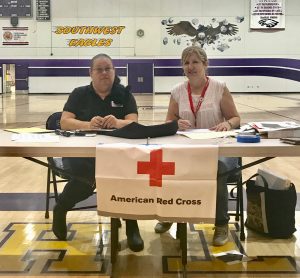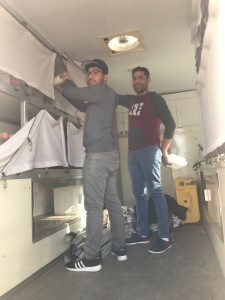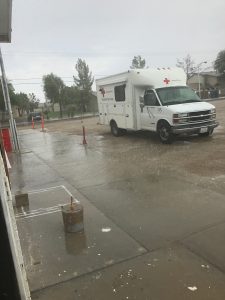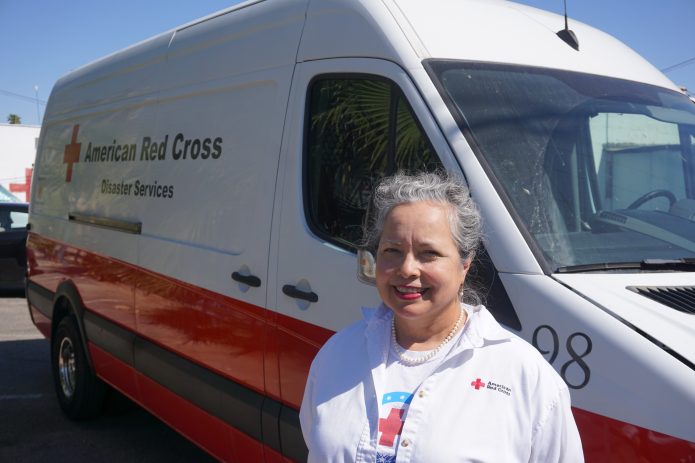
Sylvia Preciado-Platero, manager of the American Red Cross’ Imperial Valley Service Center, part of the San Diego-Imperial Counties Chapter of the Red Cross, is pictured in front of an emergency response vehicle outside her El Centro office. Preciado-Platero has led the local office for 16 years.
In the conference room of the American Red Cross’ Imperial Valley Service Center are two plaques–one signed by President Warren G. Harding, the other by President Franklin D. Roosevelt.
Both commemorate the work of the Red Cross office in the Imperial Valley. Both point to the history of the American Red Cross and the important role it has played nationwide, but more specifically the role of the organization in this remote part of California.
Sylvia Preciado-Platero, manager of the Imperial Valley arm of the San Diego-Imperial Counties Chapter of the Red Cross, takes pride in the long history of the organization in the Imperial Valley, and for the critical role the Red Cross continues to play.
She and her team—one other paid staff member, Jose Ortega, and a group of volunteers—serve a county of 150,000 people. It is the kind of work that goes beyond eight hours a day as they have to be prepared at a moment’s notice to respond to emergencies.
“You eat, breathe and live the Red Cross,” Preciado-Platero said. “You have to. You cannot be preaching preparedness if you are not prepared.”
Even as this story is being written, five members of her team, including Ortega, who is the local disaster program manager for the Red Cross, are deployed to Texas and to Florida where they are assisting victims of flooding from Hurricanes Harvey and Irma at area shelters. Preciado-Platero said even though they have families and jobs, the volunteers are ready to go when called upon because they believe in the mission of the Red Cross to help others.

Local Red Cross volunteers Imari Kariotis (left) and Melody Armendariz, manage a registration table at a shelter set up at Southwest High School in El Centro after a storm this summer affected residents of Seeley.
“Anyone who is here will tell you it matches what you carry inside. The values. The principles. They are the same values and principles of the Red Cross,” she said. “They have the humanitarian spirit and the spirit to give.”
Preciado-Platero has led the local office since May 2001. Since that time, she and her team have been there when families have lost everything to fires, to assist first responders with food, and to help manage emergency situations.
“The Imperial County Fire Department responds to various emergencies at all hours of the day,” said Imperial County Fire Chief Tony Rouhotas. “The American Red Cross has proven to be a partner that we can rely on to support the first responders and more importantly, the community as a whole. They will spend countless hours on the front lines with pre- and post-emergency incident activities. They are a true ally in emergency management.”
Along with responding to fires, the local Red Cross team has provided services following natural disasters in the county. The most recent large-scale disaster was the 2010 Easter earthquake. That was a challenging time because not only did the team have to maintain a shelter for those in need and provide food, but there were still fires unrelated to the earthquake that required Red Cross services.
Then, like the teams deployed currently to Texas and Florida, there is the need to respond on a regional, statewide, and national scale. Last year, Preciado-Platero spent three weeks in North Carolina after floods caused by Hurricane Matthew left communities devastated.
“That was one of the toughest but best experiences I have ever had,” she said. “I met so many wonderful people ready to help.”
When most think of the Red Cross, disaster response comes to mind, but the Red Cross does so much more. “A lot of people think they know what we do, but they are always surprised to learn all the things we do,” Preciado-Platero said.
Those services include providing first aid and cardiopulmonary resuscitation (CPR) training, smoke detector installations, presentations to schools and service clubs, blood services, international support and emergency services, and support to the Armed Services, specifically providing emergency communication services between those deployed and their families.
Preciado-Platero recalls a number of experiences where she and the local Red Cross office served as conduit of information for families whose loved ones had been injured or killed in action. There have also been cases where her office helped get information to soldiers who needed to rush home to be with ailing family members.
While there are a number of services provided to the community, emergency response is the cornerstone of what her team does. It means being a steady hand for those in the community experiencing hardship. Preciado-Platero and her team are trained to guide people through such difficult times.
“Showing respect, empathy and cultural sensitivity is what creates for a warm and compassionate presence for our client that may be experiencing one of their worst times,” she said.

Local Red Cross volunteers Lawson Hardrick (left) and Ricardo Flores, gather supplies from a disaster response vehicle for a shelter set up in Niland this summer after a storm displaced some residents.
This fiscal year, starting July 1, the team has responded to 14 fires to both assist firefighters with food and drink, and to provide for the immediate needs of families. Those immediate needs might include securing lodging and food—enough to get them through a few days until they can begin to rebuild. They have helped 32 clients so far, and at the time of this story, it was only three months into the fiscal year.
During the first month of the fiscal year, her team of volunteers put in an average of 90 hours to help those in need, some more than that.
One local volunteer, Melody Armendariz, who has given her time to the Red Cross for five years, said she got involved because she wanted to do something that would make a difference.
“Every month I got more and more involved and found that this is so rewarding,” she said. “When you see a client is so grateful for what you’ve done, saying they didn’t know where they would go or where they would sleep without your help, that is so rewarding.”
When a military jet crashed in an Imperial neighborhood in 2014 destroying two houses and damaging a third, Armendariz was part of the Red Cross team that responded. While no one was injured, families needed help.
“We initially provided them lodging and monetary assistance for food and clothing,” Armendariz said, adding it was a chaotic scene during which the Red Cross team thought they might have to open a shelter since power was lost to the neighborhood for a time.
Ultimately, no shelter was needed in that case. However, this summer when two storms just a few weeks apart ravaged the remote communities of Seeley and Niland, the Red Cross did have to open shelters to provide both food and, in some cases, lodging for those who had lost power.
With the amount of cases in the Imperial Valley, Armendariz said there is a need for more volunteers. To those considering joining as a Red Cross volunteer, she said, “Come and shadow somebody and see what we do and see the feeling you get out of making a difference in someone’s life.”

The local Red Cross’ disaster response vehicle is pictured in Niland during a heavy rainstorm that caused flooding and power outages in the community this summer. Some residents stayed at the Red Cross’ shelter for two nights until they could return home.
Preciado-Platero pointed out it’s not just the volunteers who make a difference. All of the Red Cross’ efforts are funded through donations so that the organization can remain autonomous from any government agency, which falls in line with three important principles—impartiality, neutrality, and independence—that guide the work of the Red Cross.
“We exist solely on the generosity of the American people,” Preciado-Platero said. “People who think of us every time they write a check. That is amazing to me.”
She told one story of an elderly Imperial Valley resident, Mrs. Shrimpf, who for years—as long as she was able to—donated $6 every month to the Red Cross.
“That might as well have been $6,000 every month as far as I’m concerned,” she said. “Mrs. Shrimpf did that for us every month, and that means a great deal to me. Can you imagine if everyone donated $6 a month?”
She added, “Our lifesaving mission truly wouldn’t be possible without the kindhearted and dedicated individuals who make monetary donations, volunteer their time and give blood.”
